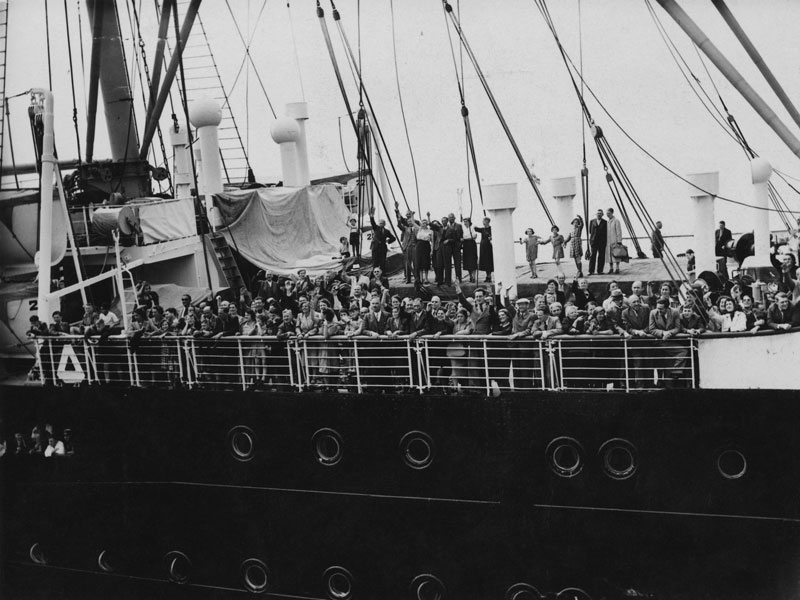80 Years Ago and Today: Refusing Refugees Help in Times of Crisis
By Sharon Samber, HIAS.org
Jun 06, 2019

Refugees arrive in Antwerp on the MS St. Louis after over a month at sea, during which they were denied entry to Cuba, the United States, and Canada, June 17, 1939. The St. Louis had originally sailed from Hamburg to Cuba, carrying over 937 mainly German-Jewish refugees from Nazi persecution.
(Three Lions/Hulton Archive/Getty Images)
This Thursday, June 6, marks the 80th anniversary of the day the M.S. St. Louis, a German passenger ship carrying 937 people– nearly all Jewish refugees fleeing Nazi Germany– was denied entry to the United States. The ship was turned away from its original destination of Cuba, and then, although the U.S. press wrote extensively and sympathetically about the plight of the passengers on board, the U.S. government refused to allow the refugees into the country.
The ship returned to Europe and Jewish organizations negotiated with several European governments to secure entry visas for the passengers. Many, however, were only temporarily safe as hundreds were trapped when Germany soon conquered Western Europe; 254 died in the Holocaust.
On World Refugee Day, June 20, HIAS and other organizations raise awareness about today’s refugees, but it seems particularly apt this year to begin the awareness-raising with the St. Louis anniversary and recall the voyage of the doomed ship. The St. Louis was blocked instead of welcomed, and refugees turned back instead of helped. It is worthwhile to examine if this moment in history is being repeated.
Some of the same reasons used in 1939 to explain the U.S. turning the St. Louis away are again being used today, as countries, including the U.S., continue to deny safe haven to refugees. In Europe, hard-line stances on immigration are issues that help elect far-right political parties and the European Union continues to be divided over how to handle asylum-seekers. In the U.S., nativism and xenophobia are on the rise, used in political rhetoric, and part of popular sentiment.
One survivor of the St. Louis, Hans Fisher, told HIAS that some things now feel the same as they did in the 1930’s. Even with his personal experience, however, Fisher says it is still hard for him to fully appreciate what today’s refugees have to deal with.
Fisher was 11 years old when he was on the St. Louis with his mother and sister. They were sent to France and then left France again for Cuba in December 1939, and ultimately landed in the U.S. receiving assistance from HIAS when they arrived at Ellis Island.
“It is difficult to understand or feel what it is like to be a refugee,” said Fisher, 91, who today lives in Newton, Mass. “Organizations like HIAS try to alleviate the gruesomeness of what is going on.”
Scott Miller, co-author (with Sarah Ogilvie) of Refuge Denied: The St Louis Passengers and the Holocaust, understands the risks facing today’s refugees and asylum seekers.
“While there are differences between today’s refugee crisis and that of Jewish refugees during the Holocaust, what they have in common is the fact that the individual consequences of a less than generous immigration policy in time of crisis can be lethal,” Miller told HIAS.
The St. Louis sailed so close to Florida that passengers could see the lights of Miami. But the State Department insisted on following the existing quota system that allowed only about 26,000 people from Germany and Austria into the United States each year. A State Department official telegraphed the passengers, telling them that they “must await their turns on the waiting list and qualify for and obtain immigration visas before they may be admissible into the United States.”
Today there are more forcibly displaced people in the world than at any point since World War II, according to the UN. Refusals to adjust immigration policies in times of crisis, as learned many years ago, can have devastating effects.
This Thursday evening, HIAS is hosting a vigil on Capitol Hill to mark the 80th anniversary of the St. Louis, to note the historic moment and to allow people to reflect on the refugee crises still occurring, including the one at the U.S. southern border, and to ask them to take action.





